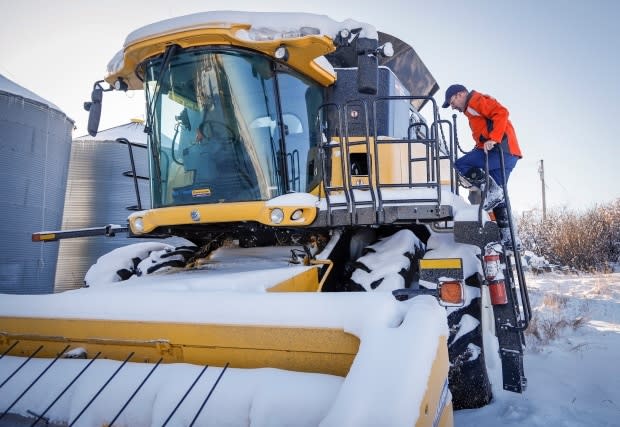'The harvest from hell': Some Sask. crop may be left in field due to wet weather, says province
Wet, cool weather this fall means poor quality for many crops in Saskatchewan, with some likely to be left in the field until spring.
"It's the harvest from hell," said Cory Jacob, a crops extension specialist with the province's Ministry of Agriculture.
Jacob said 93 per cent of crops have been combined, up from 90 per cent last month and that harvest may continue in some regions as farmers try to get the rest in before winter.
"Some producers were able to to finish up harvesting and some need more time," Jacob said. "But they've made a little more progress moving forward with getting one step closer to finishing harvest."

He said some crops will need to be harvested in the spring.
Farmers were hit with poor weather conditions that brought work to a halt for several weeks in some areas.
The entire growing season has been a tough one, Jacob said.
"We started out extremely dry, particularly in May and up until mid-June," he said.
"But then the rains started coming and really those rains saved us and gave us the crop that we had.
"So we had crops that were late to emerge, spotty germination and then really across a lot of fields we had crops in variable stages. "
That meant producers needed good fall weather. That didn't happen. Instead most of fall was cold and damp.

Crops are damp, meaning producers are having to dry them out and the quality is below average for almost everything, Jacob said.
"A significant amount of the grain in the province has been downgraded to feed grade or a lower grade, particularly cereal crops and pulse crops that were later to be harvested," he said.
The problems are hitting farmers in the pocketbook, Jacob said.
"So for example if No. 1 wheat was worth $6 [a bushel], a lower grade wheat could be down to $3 or $4, so quite a large hit on the price of the grade," Jacob said.
Now the CN Rail strike which could delay shipment.
Jacob said producers get paid when they sell grain and not being able to ship it will delay those payments.
"Producers need the money to come in to pay their bills [because] they have operating expenses. So you know that definitely could cause some issues."
Another major expense has been having to dry crops.
"Some producers have used the grain dryer since the beginning of harvest," Jacob said. "A lot are indicating 80 to 90 per cent of their crop has been put through a grain dryer.
"So it gives you an idea of the extra costs."
He said not everyone has a dryer. Some are relying on custom drying or getting help from neighbours to get the drying done.
That means damp grain is sitting in bins starting to spoil while waiting to be dried.


